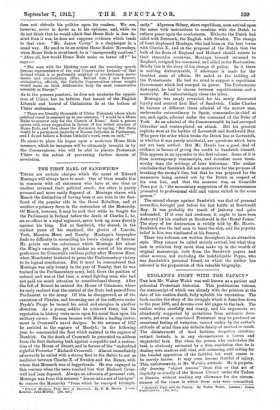THE FIRST EARL OF SANDWICH.*
'THERE are certain charges which the name of Edward Montagu will always haie to Me-et. One of them assails him common with all statesmen whO have at one time or linother reversed their political creed; the other is purely Personal and more easily disposed of. Montagu shares with Monck the distinction of having been at one time in the fore- /tont of the popular side in the Great Rebellion, and at snother a primary force in the restoration of the Monarchy. Of Monck, however, it may be said that while he fought for the Parliament in Ireland before the death of Charles I., he, an ex-officer in a royal regiment, never took up arms directly against his king. Not so Sandwich, who shared, in the -earliest years of his Manhood, the glories of Lincoln, York, Marston Moor, and Naseby. Montagn's biographer ;finds no difficulty in reconciling his hero's change of fortune. He points out the reluctance which Montagu felt about the King's execution, yet he makes no secret of his strong preference for Cr.mwell'i ruthless policy after Marston Moor, when Manchester hesitated to presS the Parliamentary victory to its logical conclusions. But it must be 'remembered that Montagu was only twenty in the year of Naseby, that he was 'trained in the Parliamentary army, held there the position of .eolonel, and was at that time a sound fighting man, who had not paid too much attention to constitutional theory. After the fall of Bristol he entered the House of COMmons, where Ire early realized that the control of the State had passed from Parliament to the Army. Of this he disapproved, as of the .execution. of Charles, and becoming one of the sufferers under Pryde's Purge he turned his mind and energies in another -direction. As a young soldier he achieved fame, but his reputation:in. history rests more upon. his naval than upon his military career. He soon became with Blake a leading instru- ment in Cromwell's naval designs. In the autumn of 1657 he assisted in the capture of Mardyk; in the following _year he commanded the fleet which assisted in the capture of Dunkirk. On the death of Cromwell he. presented an address :from the fleet declaring both against a republic and a restora- tion of the House Of Stuart, and in favour of-the " undoubted rightful Protector " Richard Cromwell. Almost immediately afterwards he sailed:with-a strong fleet to the. Baltic to act as mediator between Charles X. of Sweden and the Danes, with whom that Monarch was at loggerheads. HO was engaged in this venture when the news:reached him that Richard Crom, well had, been:deposed. Always an advocate of personal rule, Montagu was from this moment " drawn into a net of intrigue " to restore the. Monarchy "AOM Which he emerged triumph..
• Edward Montag Pint. Raid of Sandwich— By F. B. Harris. 2 vols.
. , Loadon; Jolla Murray. ems. net.]
antly." Algernon Sidney, stern republican:, soon arrived upon' the scene with instructions to combine with the Dutch to enforce peace upon the combatants. Hitherto the Dutch had sided with Denmark, the English with Sweden. The change of front displeased Montagu, who had been on the best terms with Charles X., and on the proposal of the Dutch that the bulk of the fleets of England and Holland should return to their respective countries, Montagu himself , returned to England, resigned his command, and aided in the Restoration. Briefly this is the story of his change of, policy. In it there is nothing dishonourable, if allowance is made for the troubled state of affairs. He sailed at the bidding of the Protectorate. He had no mind to support a republican Government which had usurped its power. The Protectorate destroyed, he had to choose between republicanism, and a monarchy. He unhesitatingly chose the latter.
Montagu was amply rewarded for his newly discovered loyalty and created first Earl of Sandwich. Under Charles he became at different times admiral of the narrow seas, ambassador extraordinary to Spain, commander-in-chief at sea, and, again, admiral under the command of the Duke of York. As an admiral of the Commonwealth he had surveyed Gibraltar and contemplated an attack. But his greatest exploits were at the battles of Lowestoft and Southwold Bay. Who gave the order which broke the Dutch line at Lowestoft., or whether it was purely accidental, are questions which have not yet been settled. But Mr. Harris has a good deal of evidence in favour of giving the credit to Sandwich himself. This appears in an appendix to the first volume., Some of it is from contemporary manuscripts, and therefore more trust- worthy than the writings of later historians. The author concludes that Sandwich did not manoeuvre for the purpose of 'breaking the enemy's line, but that he was prepared for the manoeuvre being carried out by the Dutch in respect of his own line, and that the measure was, as Granville Penn put it, " the momentary suggestion of fit circumstances presented to professional skill and valour. united in the same person."
The second charge against Sandwich was that of personal cowardice, brought just before his last battle at Sonthwold Bay. It was probably the result of jealousy and quire unfounded. If it ever had credence, it ought to have been destroyed by his conduct at Southwold in the 'Royal James.' The story of her destruction is vividly told by Mr. Harris. Sandwich was the last man to leave the ahip, and the'popnlar belief in him was vindicated at his funeral.
These two volumes are written throughout in an attractive style. They cannot be called strictly critical, but what they lack in criticism they more than make up in the wealth of original manuscript, both from the Sandwich papers and other sources, not excluding the indefatigable Pepys, who was Sandwich's personal friend, to which the author has referred in the preparation of this valuable biography.






































 Previous page
Previous page